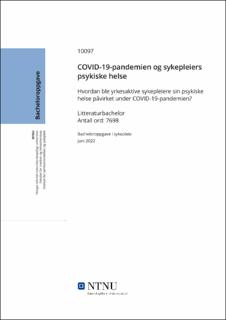| dc.contributor.advisor | Nakrem, Sigrid | |
| dc.contributor.author | Atsmu, Merhawi | |
| dc.date.accessioned | 2022-07-21T17:19:56Z | |
| dc.date.available | 2022-07-21T17:19:56Z | |
| dc.date.issued | 2022 | |
| dc.identifier | no.ntnu:inspera:110921428:46980370 | |
| dc.identifier.uri | https://hdl.handle.net/11250/3007604 | |
| dc.description.abstract | Bakgrunn:
COVID19 ble først oppdaget i byen Wuhan i Kina i slutten av desember 2019. Verdens helseorganisasjon (WHO) uttrykte samtidig bekymring for at stort antall av helsepersonell har blitt utsatt for stress, angst, utbrenthet og tretthet under COVID-19-pandemien. Sykepleiere utgjøre ca, 59% av helsepersonell verdens basis ifølge WHO, dermed vil en stor del av disse psykologiske konsekvensene ramme sykepleiere.
Hensikten med denne oppgaven er å undersøke den psykologiske effekten av COVID-19-pandemien og smittevernstiltak for yrkesaktive sykepleiere gjennom følgende problemstilling: Hvordan har yrkesaktive sykepleieres psykiske helse blitt påvirket under COVID-19-pandemien?
Metode:
Denne oppgaven er en litteraturstudie som er bygde opp av systematiske søk. Oppgaven tar utgangspunkt i ni utvalgte forskningsartikler, alle tverrsnittsstudier. Dette ble supplerte med kunnskap fra pensumbøker og andre litteraturstudie som er relevant for sykepleiere.
Resultat:
Yrkesaktive sykepleiere hadde psykiske plager under COVID-19-pandemien. Studier tyder på at flere sykepleiere ble stresset, deprimert, fikk angst og søvnproblemer. Samtidig hadde de høye arbeidskrav og arbeidsbelastning som førte til utmattelse, utbrenthet og tretthet.
Konklusjon: Sykepleiere har spilte en viktig rolle under pandemien, og har eksponert seg selv og familien deres for risiko for COVID-19 for å beskytte befolkningen. Studien har vist at yrkesaktive sykepleiere har hatt psykisk plager under pandemien og har behov for beskyttelse under slike katastrofale pandemier, samt har behov for psykososiale støtte både under pandemien og etter pandemien.
Nøkkelord: COVID-19, smittevernstiltak, sykepleiere, psykisk helse og utbrenthet | |
| dc.description.abstract | Background:
The COVID-19-pandemic was first detected in the Chinese city Wuhan in late December 2019. The World Health Organization (WHO) was concerned that large number of health professionals were exposed to stress, depression, anxiety, burnout, and fatigue during the COVID-19-pandemic. About 59% of the healthcare workers in the world are nurses according to the WHO. Therefore, nurses had most of psychological consequences.
The Aim
The aim of this study was to investigate the psychological effect of the COVID-19-pandemic and infection control measures for the active nurses through the following problem statement. How has the mental health of active nurses been affected during the COVID-19-pandemic?
Method:
This is a literature study which builds on of systematic search. It is based on nine selected research articles, cross-sectional studies. This was supplemented with knowledge form textbooks and other literature review which has relevance to nursing.
Result:
The active nurses had experienced mental health problems during the COVID-19-pandmic. Studies suggested that mores nurses became stressed, depressed, had anxiety and sleeping problem. They also had high work demands and workload which led to fatigue and burnout.
Conclusion:
Nurses have played an important role during pandemic by exposing themselves and their families to COVID-19 disease and mortality to protect their populations. The study has shown that active nurses have had mental aliments during the pandemic, and they have a need of protection during such catastrophic situations as well as psychological support both during and after the pandemic.
Keywords: COVID-19, infection control measures, nurses, mental health, and burnout. | |
| dc.language | nob | |
| dc.publisher | NTNU | |
| dc.title | COVID-19-pandemien og sykepleiers psykiske helse. | |
| dc.type | Bachelor thesis | |
